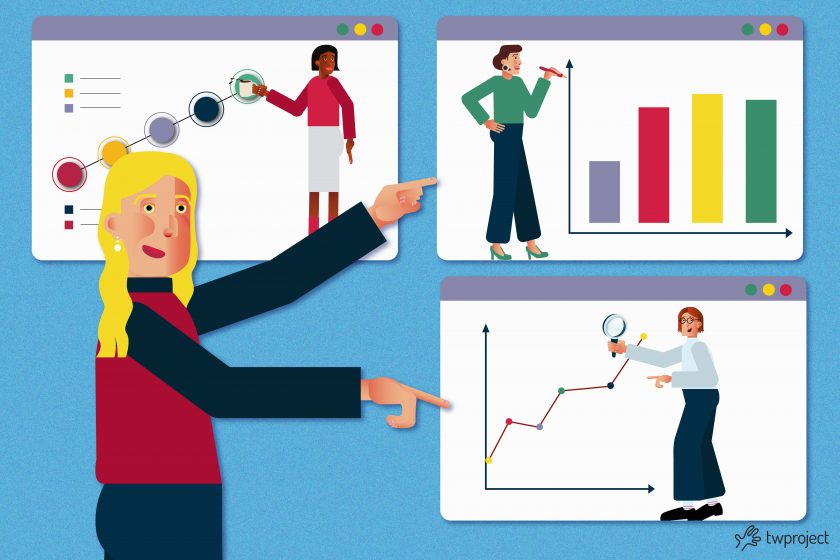Project Management and Program Management are related and often interconnected disciplines.
Projects are like trains managed by a project manager who helps drive a team’s work to achieve goals and produce a finished product or service.
A program, in contrast, is like a set of trains running on different tracks but headed for the same station (or goal). The program manager is the stationmaster who coordinates the various trains.
A project manager orchestrates the success of individual projects, while a program manager oversees the strategy of all related projects. Here is a definitive guide to better understand each role and the differences between Project Management and Program Management.
CONTENT
What is Project Management?
The project manager is in charge of leading a team and ensuring that all tasks are completed on time and within budget.
Effective project management requires a thorough understanding of different methodologies and software that can streamline the workflow.
Also, the project manager needs strong leadership and communication skills to lead team members and keep them motivated
successfully.
Project managers can cultivate creativity and innovation by promoting a collaborative and supportive work environment, which can ultimately improve project outcomes.
Project managers are responsible for carrying out several key responsibilities.
These include:
- Define the scope, objectives, and expected results.
- Develop a detailed project plan with clear milestones and schedules.
- Assign tasks and responsibilities to team members.
- Monitor progress and make necessary adjustments.
- Manage project risks and fix problems as they come up.
- Communicate regularly with stakeholders to keep them informed.
- Promote effective teamwork and collaboration among team members.
What is Program Management?
Program management involves supervising a group of related projects and activities aligned with a common goal.
Unlike projects, programs often involve multiple interdependent projects.
Program managers are tasked with ensuring that all projects within the program are coordinated effectively to achieve the desired results.
They focus on strategic planning, resource allocation, and stakeholder management.
Program management is a complex and dynamic field that requires a unique set of skills and qualifications.
The role of a Program Manager extends beyond individual projects. Their responsibilities include:
- Define strategic objectives for the program.
- Ensure effective communication and collaboration between project teams.
- Manage program budgets and allocate resources.
- Identify and mitigate risks that may affect the overall success of the program.
- Monitor the progress of each project and the program as a whole.
- Involve stakeholders and manage their expectations.
These duties require a program manager to have a holistic view of the program and its goals.
Similarities and differences between Project Management and Program Management
Understanding the nuances of Project and Program Management is key for organizations that want to deliver their initiatives effectively and achieve their strategic goals.
Similarities between Project Management and Program Management:
- Goal planning and definition.
- Priority setting and resource allocation.
- Progress monitoring and risk management.
- Team coordination and communication with stakeholders.
These shared points emphasize the fundamental principles underlying the success of projects and programs, highlighting the importance of structured planning, effective resource use, and clear communication throughout the project lifecycle.
Differences between Project Management and Program Management
Even though some responsibilities overlap, there are major differences between project management and program management:
- Project management focuses on individual projects, while program management involves multiple projects.
- Project management is temporary, while program management is long-term.
- Project management has a narrower scope, while program management has a broader strategic focus.
- Project managers work primarily with project-specific resources, while program managers must manage shared resources.
These differences highlight the different skills and perspectives required of project managers and program managers to thrive in their roles.
In project management, the focus lies on completing activities within defined constraints, while in program management, the priority is aligning with organizational goals and creating long-term value.

Program Management vs Project Management: How do they interact practically?
Program managers and project managers collaborate when projects and programs overlap.
Program management and project management are separate but strongly interconnected roles within companies.
Project managers are in charge of implementing individual projects, ensuring that they are completed on time, within budget, and with the expected quality.
Program managers, in contrast, oversee a set of related projects, known as a program, ensuring that they work together to achieve broader strategic objectives.
They interact daily through communication, priority alignment, and dependency management.
Whereas the project manager focuses on operational activities, the program manager has an overview and coordinates resources to avoid conflicts or duplication.
For example, if two projects require the same team, the program manager’s job is to rebalance the schedule so as not to slow down the entire program.
Also, feedback from project managers is essential to enable the program manager to adapt the strategy or recalibrate the objectives. Harmonious collaboration between project and program managers is therefore essential for short- and long-term organizational success.
Program Management vs Project Management: using a software
Both project managers and program managers can benefit from various software tools to improve their effectiveness and efficiency.
Both should choose a tool that suits their specific needs, helping them to manage resources successfully, monitor progress, and streamline communication between team members and stakeholders.
In a market offering a wide range of digital options, Twproject can be the right choice.
This project management software helps create and assign tasks and set and track deadlines for projects and programs.
This tool gives managers and teams a central place to communicate, share files, and collaborate in real-time. It makes it easy to have quick conversations and integrates with other tools for a smooth workflow.
Twproject provides granular deadline management, task breakdown, cost tracking, and real-time progress monitoring
for project managers.
A comprehensive overview benefits project managers by making it easier to identify project dependencies, allocate resources efficiently, and manage risks on a larger scale.
Automatic reports, interactive dashboards, and predictive analytics tools help you make faster, more informed decisions.
In short, Twproject improves operational efficiency and enhances consistency between projects and programs, boosting overall value for your company.





Great post!